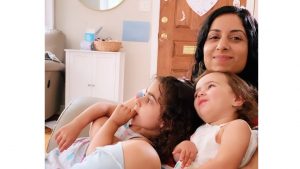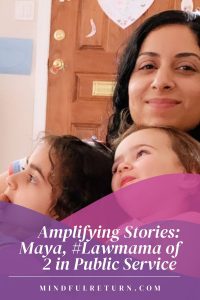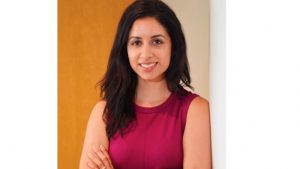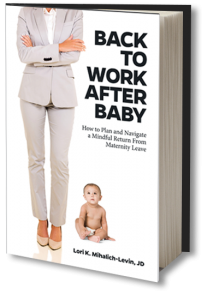 Today, we’re excited to share the working mama story of Maya Uppaluru Mechenbier, one of our Mindful Return alums! If you’ve been following along on the Mindful Return blog, you know that a few weeks ago we announced our 7 specific ongoing diversity and inclusion commitments. (See Mindful Return’s Diversity Commitments: Reporting Out from My Work with a Diversity Consultant.) One of these commitments was to use the power of storytelling to weave the perspectives of a wide range of working parent experiences into our weekly blog posts and newsletters. This interview is the third in our “Amplifying Stories” series.
Today, we’re excited to share the working mama story of Maya Uppaluru Mechenbier, one of our Mindful Return alums! If you’ve been following along on the Mindful Return blog, you know that a few weeks ago we announced our 7 specific ongoing diversity and inclusion commitments. (See Mindful Return’s Diversity Commitments: Reporting Out from My Work with a Diversity Consultant.) One of these commitments was to use the power of storytelling to weave the perspectives of a wide range of working parent experiences into our weekly blog posts and newsletters. This interview is the third in our “Amplifying Stories” series.
Maya is an Asian woman lawyer of two small children. She also happens to be an attorney with the federal government. Tune in below for her important perspectives on work, second-generation American parenthood, and the early days of motherhood – especially her advice on identifying and coping with postpartum anxiety.
**********************************
Mindful Return: Maya! Welcome to the Mindful Return blog. First, we’d love to hear a bit about your working parent story. Where do you live? How old are your kids? And what type of work do you do?
Maya: I live in Washington DC, with my husband and two daughters, ages 4.5 and almost 2. I’m a lawyer and currently working for the federal government in a health data policy and regulatory advisor role. Prior to my current role, I worked as a digital health counsel at a law firm here in DC. I’ve also had career public service roles at the Department of Health and Human Services (HHS) and the Federal Communications Commission (FCC).
Mindful Return: What inspired you to do the type of work you’re doing?
Maya: I’ve always been interested in public service and knew I wanted to work for the federal government since I was in law school. University of Maryland School of Law is a great school for people interested in health care. And it happened that the Affordable Care Act was being negotiated while I was a 1L.
I was simultaneously learning about constitutional law and the basics of health care regulation while also seeing so many of the same themes play out politically in the news. Also, I took a memorable class on internet privacy and data regulation. And I started thinking I wanted to work at the intersection of health care and technology.
I remember mentioning this idea to friends at the time and getting the response, “those are two really different things!” Now pretty much every major consumer tech brand has a health care vertical. I’m so glad I chose this field. It’s constantly evolving and continuously interesting and inspiring for me.
Mindful Return: What was your biggest challenge heading back to work after having a baby?
Maya: With my first, the biggest challenge was lack of sleep. My first was still waking up to nurse every 2-4 hours at night when I returned to work after 3.5 months. This made it very difficult to focus. I am a person who needs a solid 6-8 hours of sleep at night, or I can’t function.
At the time, the federal government did not offer paid leave. I had scrapped together the time I took off from annual leave and sick leave, as well as unpaid time off. My husband only had two weeks of paternity leave, some of which was taken up by our hospital stay. So I was alone most of the day with a baby who screamed in protest ahead of every nap. She didn’t sleep through the night until closer to 7 months old. (This was when we sleep trained.) It’s around that time that my mental health and focus rebalanced. And I remembered that I actually enjoyed my job.
My second slept pretty well early on. However, I had really unexpected postpartum anxiety (PPA) that struck when she was between 4 to 6 months old. I went back to work when my daughter was about 4.5 months old. So it was right in the middle of this period (probably not a coincidence).
I had spent some time after the birth of my first daughter writing about the postpartum experience and interviewing women who had postpartum anxiety. Only later, when it hit me personally, did I really understand what those women had been saying. In case this helps anyone reading identify their own PPA, mine manifested in obsessive ruminating thoughts, decision paralysis, a constant physical feeling of being panicky and almost nauseated, shallow breathing, and an accelerated heart rate that was difficult to calm down.
Working at a large law firm at that time, I had an incredibly supportive boss who I felt comfortable speaking freely to about this. And she allowed me to transition back into a full workload slowly. At one point, I shared that I felt so much more comfortable at work than I did at home with my two kids, where I often felt so frozen with anxiety that I couldn’t enjoy my time with them. (This was a source of guilt for me. What did those feelings say about me as a mother?) She wisely responded, “Well that’s because you’ve been working for a decade, and you’ve been a mom of two for just a few months. It makes perfect sense. It will get better.”
She was right. Bizarrely, I stopped experiencing anxiety symptoms around the time we all started our COVID lockdown. And despite the new and startling situation of having to work at home with both kids and no child care during a global pandemic. Go figure!
Mindful Return: How has being a member of the Asian community shaped your working parent experience?

Maya: I don’t think being Asian in particular has shaped my experience as much as being a second generation American. That is, growing up in the United States with its particular culture or mix of cultures. While being raised by parents who come from a different culture. Understanding what it’s like to feel “other.” To not feel “normal.” And to not see yourself represented in popular culture and media.
As a young child growing up for a period of time in the suburbs of Massachusetts, I remember wishing my skin was lighter like all my classmates and the Disney princesses I watched on repeat. As a result, I’m very sensitive about how we speak to our daughters about skin color and appearance generally, including ideas about what is beautiful and what isn’t.
Parenting your own kids gives you an interesting opportunity to reflect on how you were raised, how you react to things, how you speak to yourself, and what behaviors and traits you value and devalue. Then you can make some intentional decisions about how you want to parent your kids and prepare them for the context and world in which they will grow up. I am eternally grateful to have strong friendships with other mothers who have had similar challenges and experiences and have adopted similar goals in their own parenting. These women have been a crucial foundation of support throughout my parenting journey.
Even though our racial and ethnic backgrounds may all be different, I’ve found that second generation kids have more in common than not.
Mindful Return: What’s your biggest hope or dream for your little ones?
Maya: I hope they grow up feeling confident that they can have fulfilling, purpose-driven careers and also enjoy quality time with their families (if that’s what they want!), because they saw that example growing up. I hope the systems and culture around them are more supportive of all working families by the time they’re adults.
Mindful Return: Name one of each of the following that inspires you *or* that you find incredibly entertaining: (1) a podcast; (2) a book; (3) a show; and (4) an Instagram account.
Maya: (1) A Podcast – The Ezra Klein Show.
(2) A Book – I just finished The Premonition: A Pandemic Story, by Michael Lewis. It raised some really tough but important questions about what constitutes effective government leadership and decision making in a crisis.
(3) A Show – My husband and I recently watched For Sama, a documentary about a family in Aleppo, Syria. It was really powerful and stuck with us. We’re also in the second season of Ozark and are obsessed.
(4) An Instagram account – Nedra Glover Tawwab (@nedratawwab) is a must follow for any working parent! Her book, Set Boundaries, Find Peace, is great too.
Mindful Return: And finally, what’s one question I didn’t ask here, but that you’d like to answer? (And then please answer it!)
Maya: What do I wish I’d known before having my kids and starting this crazy ride?
First, I wish I’d known that one of the most important things you can do as a parent is to be kind to yourself. Start really dealing with that self-critical voice in your head as soon as possible. Because that voice becomes how you talk to your kids. Which becomes how they talk to themselves. A better cycle can start when you work on having more compassion with yourself.
The second most important thing I’ve learned is it’s up to you to set and honor your own boundaries with people. No one else will do it for you.
 Maya Uppaluru has served in several federal government positions focusing on technology and health care, including at the Federal Communications Commission, Department of Health and Human Services, and now at the White House with the U.S. Digital Service. Prior to her current position, she was a Counsel with Crowell & Moring LLP’s Digital Health practice. She lives in Washington, DC, with her husband and two daughters.
Maya Uppaluru has served in several federal government positions focusing on technology and health care, including at the Federal Communications Commission, Department of Health and Human Services, and now at the White House with the U.S. Digital Service. Prior to her current position, she was a Counsel with Crowell & Moring LLP’s Digital Health practice. She lives in Washington, DC, with her husband and two daughters.
Want more practical tips on working parenthood? Check out my book, Back to Work After Baby: How to Plan and Navigate a Mindful Return from Maternity Leave


